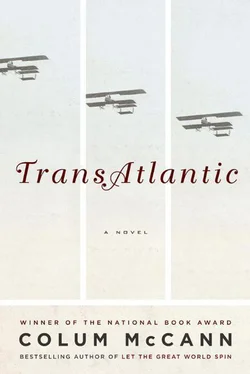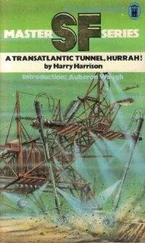They pushed their horses on through, towards the cliffs that overlooked the harbor.
A man came towards them. He wore two boards draped across his shoulders, tied with a string. On it were the prices to Boston, New York, Newfoundland. He called out the prices in a singsong. Some children tugged at his pockets. He slapped them away.
The crowd grew so thick that they had to dismount to guide their horses.
A young priest walked among the crowd, looking for the sick. To administer the Last Rites. He was fingering rosary beads as he went. He glanced at Douglass. They had never seen each other before, but for a brief moment they both thought they recognized one another and they stopped to say something, but nothing came, no words between them.
The priest stepped away, under the overarching green branches of a tree where a child’s clothes hung limp.
— Father, said Isabel. Excuse me, Father.
The priest turned and stepped towards them. His eyes were huge and tired. He pulled the rosary beads tight around his fingers. His face sharpened. His voice was bitter. No, the priest said, he had not seen anyone answering to Lily’s description. He toed his foot into the mud, as if he might find her there. He turned then and spat into his hands. No, he said again, sharply.
The priest went on, calling to the people around him in the Irish language.
Isabel shivered and touched the neck of her horse. Douglass pulled his hat down further and guided his horse away by the reins. The sisters, too, had fallen into a reverent silence. The wind came off the sea and rose up to meet them. The harbor curved like a question mark. A dozen or more wooden ships were dotted on the water below. A small, sad flotilla of masts and tightened sails. Their names scrubbed off by the waves.
They walked their horses to within ten yards of the edge of the cliff. The town itself lay below them like a twitching thing. The thatch of the roofs. The bend of the trees. Carriages moving like small insects along the waterfront towards the square. Douglass knew what chaos lay down there, what desires, what fevers. Yet it was immense with beauty. The town of Cove genuflected to the water. Birds flew ravenously around the cliffs, weightless on the updrafts.
He wrapped the reins around a tree and walked to the edge of the cliff. He took off his hat. The wind and rain rang fierce around him. It took him a moment to realize that Isabel was at his side. The two sisters remained behind, perched now on their horses. The pale of the waves came upon the shore below.
Isabel twined her arm around his. Her face against his shoulder. He was aware of the sisters watching. He wished he could gently prise her from him, but she stayed there, looking down over the town.
Soon the sun would fall and the sea darken and all the land about them would go cold.
IT WAS LATE afternoon by the time they found Lily. Rainsoaked and shivering on the pier. Her head shawled, her body mummied into a coat. She had bought her ticket and was waiting for the morning boat. She would not look at them, her face drawn in some private anguish.
Douglass and the two sisters stood apart. They watched as Isabel bent down in front of Lily. A supplicant. They looked as if they were praying together.
Isabel had brought a few days’ worth of food. Wrapped in a blue teacloth. Bundled and tied. She pressed it gently into the young girl’s arms. She reached inside her coat, brought out a number of folded bills that she quickly stuffed into Lily’s palm. Douglass felt a chill. He watched as Lily moved her mouth but did not seem to say anything. What words went between them? What silence? There was a howl from a nearby shop. The screech of a woman. The thump of a fist. A din of laughter from a public house. From somewhere distant came the sound of a mandolin.
Isabel peeled her gloves off, and pressed them, too, into Lily’s arms. Then she reached inside her own coat and fumbled at her neck. A brooch of some sort. She handed it to Lily. The girl smiled. Isabel leaned forward and embraced the maid, whispered something in her ear. Lily nodded and pulled the shawl tight down over her head. What thoughts trembled there? What fierceness had brought her here?
Douglass felt rooted to the ground. It was as if he could not even pick up his feet. He longed for the warmth of a fire. He pulled his collar up and coughed into it. He felt his breath bounce back towards him. Negro girl. Ran away. Goes by name Artela .
Isabel glanced over her shoulder and called out to her sisters. They brought her horse forward. Her long dress was muddied at the hem. She wiped her feet against the cobbles and climbed demurely to the saddle, spurred the horse through the thronged streets. They moved through the town, past an auctioneer’s shop, and away.
THE PRIEST WATCHED them crest the hill. There was a long scar of dark mud along the side of his soutane where he had slipped and fallen. He still held the rosary beads in his fist, though they were looser now, they jangled at his hip. Isabel raised her hand in parting, but the priest did not respond. He followed them metronomically, his head turning, the rest of his body clamped in place. Then he strode away through the wet grass towards the fires.
THE HORSES DRIPPED with exhaustion. Skittishly they moved through the dark. It was already well beyond midnight when they got home. Mr. Jennings was waiting in the yard. He had prepared food and hot drinks and blankets. The yard was a commotion.
When Douglass put his foot to the cobbles his knee half-buckled underneath him. He was given a candle and a blanket. He trudged indoors. His shadow multiplied upon the stairs.
That night he could not sleep. Towards daylight he went downstairs to the quiet of the library. His knees ached. His shoulders felt welded to his neck. He entered the room quietly. Isabel was sitting in the corner, in the gloom. She looked up to see him come in: it was his ritual to use the ladder to move himself along the bookshelves. He waited a moment in the doorway, stepped across, took her in an embrace. Only that. He held his hand at the back of her hair. He hesitated a moment. She sobbed. When he pulled away, the shoulder of his shirt was wet.
ON HIS LAST morning in Cork, Frederick Douglass took a jaunting car, alone. The horse seemed to yield to him. The reins felt soft in his hands. He went southwest of the city and strolled the strand. Quiet here. No emigrant ships. The tide was out and the beach was penciled by a series of soft sand ripples. Perfect echoes, one after the other, stretching out to the shadowfold of the horizon. No sea anymore. Just cloud. He felt a pang of homesickness: it reminded him so much of Baltimore.
When he placed his foot down, the water squelched beneath the sole of his boot. A brief imprint. The ground felt mobile beneath him. He lifted his foot and watched the water leak away, the sand rebound. It was a thing to do over and over again, footprint after footprint.
The sand apparently stretched for miles, but Isabel had told him to be careful, the area was renowned for its swift, quiet tide. The water could insinuate itself secretly, rush in, turn, surround him, and he would be trapped. He found it hard to imagine. It looked, to Douglass, so very peaceful.
He bent down and in the rippled layers noticed a number of tiny crabs pedaling their legs in the sand. He lifted one onto the palm of his hand. The creature was almost translucent, its eyes high and unwieldy. A fiddler crab, perhaps. It ran to the edge of his fingers, hesitated, returned. He moved his arm in the air and the crab scuttled to the high part of his wrist. Douglass dropped it down into the sand again where it burrowed and hid. How quickly it disappeared.
He noticed a number of women farther out on the strand, stooping to collect shells. They wore long headscarves and carried straw baskets on their backs. Searching for food. He had read in the newspapers that the blight was worsening, that the price of flour had doubled within a few days, that stocks of corn were lower than ever. It was only hoped that the next year’s crop would not fail.
Читать дальше












